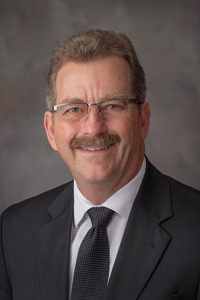Broadband access map, data repository proposed
The Public Service Commission would be required to create and maintain an official Nebraska location fabric broadband access map and data repository under a bill heard by the Transportation and Telecommunications Committee Feb. 8.

LB914, introduced by Brainard Sen. Bruce Bostelman, would require the access map to include broadband availability and service quality in all serviceable locations in Nebraska by July 1, 2024. In addition, a repository for broadband data and information including types of internet services, areas deemed to be served, underserved or unserved, the number of providers and service prices would be required under the bill.
Current and planned broadband infrastructure projects and download and upload speeds also would be included in the repository as well as any other factors deemed relevant by the commission. The PSC could contract with private parties to create and maintain the map and repository and any recipient of support from the Nebraska Telecommunications Universal Service Fund, Nebraska Broadband Bridge Act or federal funds administered by the commission would be required to provide necessary information.
Bostelman said the Federal Communications Commission – expected to begin creation of a similar broadband map later this year – has delayed too long. An access map would provide the Public Service Commission with valuable information and allow for more strategic broadband deployment in Nebraska, he said.
“Having a fabric location map would allow for a strategic approach when awarding funds and prevent funds from being misused,” Bostelman said. “This map will provide detailed information regarding broadband services, current infrastructure and information regarding the service [provision] that currently does not exist or is woefully missing.”
Tim Schram, Public Service Commission member, testified in support of LB914. Schram expressed concern about the quality and availability of data expected to be collected later this year by the FCC.
“It makes sense for states to initiate their own program for the collection of this information,” Schram said. “Having a state-owned broadband access map and data repository that is accurate and up to date would be beneficial to the commission and other policymakers as we work together to increase broadband access across the state.”
Bostelman said he would offer an amendment to clarify that federal funds would pay for the bill’s implementation.
Burke Brown spoke on behalf of the Nebraska State Education Association in support of the bill. The foundation of educational experiences is affordable, reliable and secure internet connectivity, he said, and mapping would allow districts to identify where at-risk students reside.
Also in support of the bill was Al Juhnke, who testified on behalf of the Nebraska Pork Producers Association and an array of other agriculture and livestock associations.
“This isn’t just a rural issue. We need it for our farmers,” Juhnke said. “I can’t build a pig farm unless I have broadband or high-speed internet to run my fans, systems … and all of the other things I do,” he said.
Danny DeLong testified in support of LB914 on behalf of AARP Nebraska. Despite state and federal efforts over the past decade to ensure households have access to high-speed broadband, he said, gaps remain in deployment, adoption and digital literacy. The bill would help overcome remaining challenges by expanding the PSC’s authority to collect data about broadband, DeLong said.
“The availability, affordability and reliability of broadband internet … services are essential to the health and quality of life of our membership and of other older citizens who live in Nebraska,” he said.
In opposition to the bill was Tip O’Neill, president of the Nebraska Telecommunications Association. O’Neill said accurate maps are integral to ensure appropriate broadband deployment, however, the state should defer to the FCC’s efforts to improve the mapping process at the federal level.
“We’ve been frustrated with the FCC and the progress it’s made, but we believe the FCC, with the incentives and financial support of $98 million provided by Congress in the CARES Act, is finally making considerable progress at improving broadband mapping,” he said.
John Idoux testified in opposition on behalf of Lumen Technologies. Lumen would prefer a single, national approach to broadband mapping rather than 50 separate state solutions, he said.
“LB914 requires the commission to create a map by July 2024, however most people in the industry expect the FCC to have [a broadband map] completed way before then,” he said. “Secondly, I think LB914 greatly [underestimates] the cost, the resources and the complexities of an accurate, dynamic and up-to-date map … if there was a cheap and easy way to produce a broadband mapping solution, we wouldn’t be here today.”
The committee took no immediate action on LB914.

